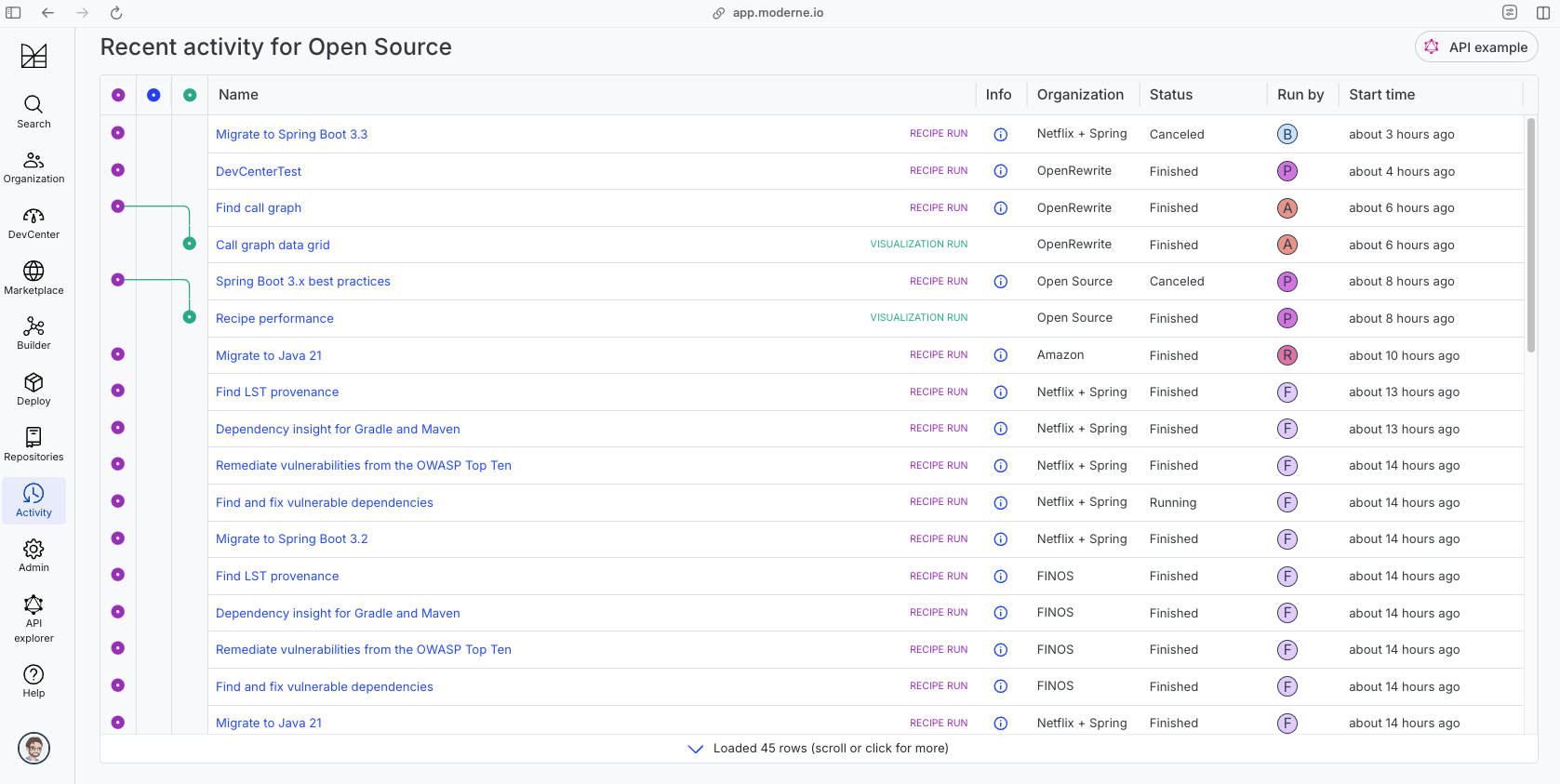Migrate to AssertJ from JUnit Asserts
In this tutorial, we'll use OpenRewrite to perform an automated migration from JUnit Asserts to AssertJ. AssertJ is a Java library that provides a rich set of assertions and truly helpful error messages, improves test code readability, and is designed to be super easy to use within your favorite IDE.
Example Configuration
The migrate to AssertJ recipe can be applied by adding OpenRewrite's plugin to your project and including a dependency on rewrite-testing-frameworks:
- Gradle
- Maven
plugins {
id("java")
id("org.openrewrite.rewrite") version("7.26.0")
}
rewrite {
activeRecipe("org.openrewrite.java.testing.assertj.JUnitToAssertj")
}
repositories {
mavenCentral() // rewrite-spring is published to Maven Central
}
dependencies {
rewrite(platform("org.openrewrite.recipe:rewrite-recipe-bom:latest.release"))
rewrite("org.openrewrite.recipe:rewrite-testing-frameworks")
// Other project dependencies
}
<build>
<plugins>
<plugin>
<groupId>org.openrewrite.maven</groupId>
<artifactId>rewrite-maven-plugin</artifactId>
<version>6.29.0</version>
<configuration>
<activeRecipes>
<recipe>org.openrewrite.java.testing.assertj.JUnitToAssertj</recipe>
</activeRecipes>
</configuration>
<dependencies>
<dependency>
<groupId>org.openrewrite.recipe</groupId>
<artifactId>rewrite-testing-frameworks</artifactId>
<version>3.27.0</version>
</dependency>
</dependencies>
</plugin>
</plugins>
<build>
At this point, you're ready to execute the migration by running mvn rewrite:run or gradlew rewriteRun. After running the migration you can inspect the results with git diff (or equivalent), manually fix anything that wasn't able to be migrated automatically, and commit the results.
Before and After
For the full list of changes, this recipe will make, see its reference page.
- JUnit Assert Test Class (Before)
- AssertJ Test Class (After)
package org.openrewrite.example;
import static org.junit.jupiter.api.Assertions.assertEquals;
import static org.junit.jupiter.api.Assertions.assertTrue;
import static org.junit.jupiter.api.Assertions.fail;
import static org.junit.jupiter.api.Assertions.assertThrows;
public class ExampleJunitTestClass {
@Test
void someTest() {
try {
QueryRegistry queryRegistry = new QueryRegistry.Builder().build();
fail();
} catch (IllegalArgumentException ignored) {
}
// ...
assertEquals(1, currentSubs.size());
assertEquals("myPrefix_subId", currentSubs.get(0).getSubscriptionId());
assertTrue(allSubscriptions.containsKey("myApp"));
}
@Test
void shouldFailToInitializeWithMissingTable() {
when(catalog.loadTable(any())).thenThrow(new RuntimeException());
IcebergWriterStage stage = new IcebergWriterStage();
assertThrows(RuntimeException.class, () -> stage.init(context));
}
}
package org.openrewrite.example;
import static org.assertj.core.api.Assertions.assertThat;
import static org.assertj.core.api.Assertions.fail;
import static org.assertj.core.api.AssertionsForClassTypes.assertThatExceptionOfType;
public class ExampleJunitTestClass {
@Test
void someTest() {
try {
QueryRegistry queryRegistry = new QueryRegistry.Builder().build();
fail("");
} catch (IllegalArgumentException ignored) {
}
// ...
assertThat(currentSubs.size()).isEqualTo(1);
assertThat(currentSubs.get(0).getSubscriptionId()).isEqualTo("myPrefix_subId");
assertThat(allSubscriptions.containsKey("myApp")).isTrue();
}
@Test
void shouldFailToInitializeWithMissingTable() {
when(catalog.loadTable(any())).thenThrow(new RuntimeException());
IcebergWriterStage stage = new IcebergWriterStage();
assertThatExceptionOfType(RuntimeException.class).isThrownBy(() -> stage.init(context));
}
}
Running this recipe with the Moderne CLI
You will need to have configured the Moderne CLI on your machine before you can run the following command:
mod run . --recipe org.openrewrite.java.testing.assertj.JUnitToAssertj
If the recipe is not available locally, then you can install it using:
mod config recipes jar install org.openrewrite.recipe:rewrite-testing-frameworks:3.27.0
See how this recipe works across multiple open-source repositories
Run this recipe on OSS repos at scale with the Moderne SaaS.

The community edition of the Moderne platform enables you to easily run recipes across thousands of open-source repositories.
Please contact Moderne for more information about safely running the recipes on your own codebase in a private SaaS.